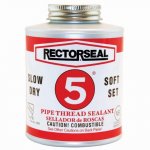Cheese
Member
- Joined
- Jan 16, 2015
- Messages
- 12,499
rst said:Remodeling our 1999 Airsteam Bambi, needed tools to redo PEX lines. I bought the copper clamping breaker, new clamping rings, clamping tool and short lengths of red and white pipe. All new to me, been soldering copper for 50 years, including my house done 35+ years ago.
FWIW...I use a combination of copper and PEX. Copper for the long runs and PEX where you have a bunch of short connections like on a bathroom shower/diverter valve.
The PEX is also nice for large radius situations. For one application on an in-wall toilet, I built a wooden jig with the radius I needed and then heated the PEX with a heat gun and placed it in the fixture to cool down. About 2-3 hours later I removed the PEX and it was formed exactly like I needed it to be, it was a cold water run...don't know what would happen if it was on a hot water run. [tongue]


